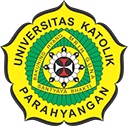Bachelor of Management Program. In accordance with the graduate competency standards and the Indonesian National Qualifications Framework (KKNI) as stipulated in Ministry of Education and Culture Regulation No. 3 of 2020, the Graduate Learning Outcomes (GLO) are composed of four components: Attitude (A), General Skills (GS), Knowledge Mastery (KM), and Specialized Skills (SS).
A. Attitude (SK)
Every graduate of the UNPAR Bachelor of Management Program must have the following attitudes:
Students are able to internalize academic ethics and respect business ethics in line with the spiritual values of UNPAR and loyalty to Pancasila, as well as demonstrate awareness of continuous learning at the local, national, and global levels.
B. Knowledge Mastery (PP)
The knowledge of students in the UNPAR Management Undergraduate Program is as follows:
- Students are able to access, analyze, and critically evaluate relevant information to solve management and business problems systematically and creatively.
- Students are able to apply leadership and entrepreneurship principles.
- Students understand relevant technological developments and changes in the natural, social, and governance environments.
C. General Skills (KU)
The general skills that students in the UNPAR Management Undergraduate Program must possess are as follows:
- Students are able to collaborate effectively in groups to produce measurable outputs and are able to build networks at the local, national, and international levels.
- Students are able to critically reflect on feedback regarding their own performance in order to plan for self-development.
- Students are able to think critically, resulting in alternative evaluations of their decision-making.
D. Specific Skills (KK)
The specific skills that students must possess in the UNPAR Management Undergraduate Program are as follows:
- Students are skilled in making effective management and business decisions.
- Students are able to develop strategic and operational plans, implement and control them.
- Students are skilled in conducting simple theoretical and empirical studies in the field of management based on scientific methods and applicable codes of ethics.
- Students are able to collect, process, and present management and business data using relevant technology.

